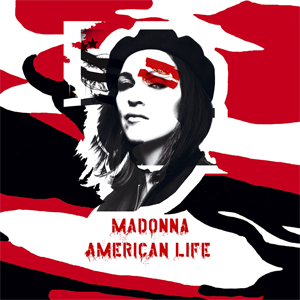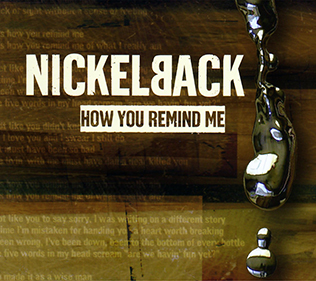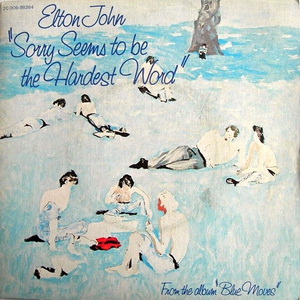
"Somebody to Love" is a rock song that was written by Darby Slick. It was originally recorded by the Great Society, and later by Jefferson Airplane. Rolling Stone magazine ranked Jefferson Airplane's version No. 274 on their list of the 500 Greatest Songs of All Time.
"Unchained Melody" is a 1955 song with music by Alex North and lyrics by Hy Zaret. North wrote the music as a theme for the prison film Unchained (1955), hence the song title. Todd Duncan sang the vocals for the film soundtrack. It has since become a standard and one of the most recorded songs of the 20th century, most notably by the Righteous Brothers in 1965. According to the song's publishing administrator, over 1,500 recordings of "Unchained Melody" have been made by more than 670 artists, in multiple languages.

"I'm with You" is a song by Canadian singer-songwriter Avril Lavigne from her debut studio album Let Go (2002). It was released to radio as the third single from the album on November 18, 2002, by Arista Records. The song was written by Lavigne and the production team the Matrix, who solely helmed its production. According to Lavigne, the song was inspired by feelings of loneliness she experienced over being single.

"Can't Help Falling in Love" is a song written by Hugo Peretti, Luigi Creatore, and George David Weiss and published by Gladys Music, Inc. The melody is based on "Plaisir d'amour", a popular French love song composed in 1784 by Jean-Paul-Égide Martini. The song was initially written from the perspective of a woman as "Can't Help Falling in Love with Him", which explains the first and third line ending on "in" and "sin" rather than words rhyming with "you".

"American Life" is a song by American singer-songwriter Madonna. It is the title track from her ninth studio album American Life (2003), and was released digitally as the lead single from the album on March 24, 2003, by Maverick Records. It is a pop, techno and folk song written and produced by Madonna and Mirwais Ahmadzaï; the lyrics to "American Life" feature violent transitions and a political and religious view from Madonna. She questions the shallowness of modern life and the American Dream during the presidency of George W. Bush. Towards the end of the song, Madonna raps, naming the people who were working for her.

"Sk8er Boi" is a song by Canadian singer-songwriter Avril Lavigne, released as the second single from her debut album, Let Go (2002). It was written by Lavigne and the Matrix, and produced by the Matrix. The song, which combines power pop and pop-punk elements, lyrically tells a story told from the singer's viewpoint about her rocker boyfriend and a girl he knew in high school who rejected him because he was a skateboarder and she did ballet.

"Big Yellow Taxi" is a song written, composed, and originally recorded by Canadian singer-songwriter Joni Mitchell in 1970, and originally released on her album Ladies of the Canyon. It was a hit in her native Canada as well as Australia and on the UK Singles Chart. It only reached No. 67 on the US Billboard Hot 100 in 1970, but was later a bigger hit there for her in a live version released in 1974, which peaked at No. 24. Charting versions have also been recorded by the Neighborhood, and most notably by Amy Grant in 1995 and Counting Crows and Vanessa Carlton in 2002. The song was also sampled in Janet Jackson's "Got 'til It's Gone" (1997).

"Stayin' Alive" is a song written and performed by the Bee Gees from the Saturday Night Fever motion picture soundtrack. The song was released in December 1977 by RSO Records as the second single from the Saturday Night Fever soundtrack. The band wrote the song and co-produced it with Albhy Galuten and Karl Richardson. It is one of the Bee Gees' signature songs. In 2004, "Stayin' Alive" was placed at No. 189 by Rolling Stone on their list of the 500 Greatest Songs of All Time. The 2021 updated Rolling Stone list of 500 Greatest Songs placed "Stayin' Alive" at No. 99. In 2004, it ranked No. 9 on AFI's 100 Years...100 Songs survey of top tunes in American cinema. In a UK television poll on ITV in December 2011 it was voted fifth in The Nation's Favourite Bee Gees Song.

"How You Remind Me" is a song by Canadian rock band Nickelback. With lyrics written by lead singer Chad Kroeger and music composed by the band, the track was released on July 17, 2001, as the lead single from their third studio album, Silver Side Up (2001). A "Gold Mix" was made for latter editions of the single, with the heavier guitars edited out of the chorus.

"U Got It Bad" is a song by American singer Usher. It was released through Arista Records as the second official single from his third studio album 8701 (2001). It was written by Usher, Jermaine Dupri and Bryan-Michael Cox, and produced by Dupri, with Cox credited as co-producer. Released in the United States on August 21, 2001, "U Got It Bad" is an R&B ballad that, according to MTV, incorporates "digi-coustic" guitars, a "slow-burning bass line" and "sex funk" drums. The lyrics notably contain some quick direct allusions to other soul music ballads, mainly Maxwell's "Fortunate" and Prince's "Adore".

"Get Busy" is a song by Jamaican dancehall singer Sean Paul, from his album Dutty Rock. The song was one of the many hits from the jumpy handclap riddim known as the Diwali Riddim, produced by then-newcomer Steven Marsden, and was the only song that never made the "Diwali" rhythm album on Greensleeves Records as it was more than likely a late entry.

"Can You Feel the Love Tonight" is a song from Disney's 1994 animated feature film The Lion King composed by English musician Elton John with lyrics by Tim Rice. Released as a single in May 1994, the song was a hit in the UK, peaking at number 14 on the UK Singles Chart, and achieved success in the United States, reaching number four on the Billboard Hot 100. The song was a number-one hit in Canada and France. At the 67th Academy Awards in March 1995, it won the Academy Award for Best Original Song. The same year, the song also won John the Grammy Award for Best Male Pop Vocal Performance. Completing a trifecta, the song also won a Golden Globe at the 52nd Golden Globe Awards held in 1995 for Best Song - Motion Picture.

"White Flag" is a song by English singer-songwriter Dido, released as the lead single from her second studio album, Life for Rent (2003). The song was first released to US radio on 7 July 2003 and was issued in the United Kingdom as a physical single on 1 September 2003. The song performed well on record charts around the world, peaking at number one in Australia, Austria, the Czech Republic, Germany, Italy, Norway, and Portugal. In Dido's native UK, it reached number two on the UK Singles Chart, and in the United States, it climbed to number 18 on the Billboard Hot 100.

"Sorry Seems to Be the Hardest Word" is a song written by English musician Elton John and songwriter Bernie Taupin. It was recorded by John and released in 1976, both as a single and as part of the Blue Moves album. It was John's second single released by The Rocket Record Company. The song is a mournful ballad about a romantic relationship which is falling apart.

"Mundian To Bach Ke" (IPA:[mʊɳɖɪãːtõːbətːʃkeː]), also titled "Beware of the Boys (Mundian To Bach Ke)" or "Beware", is a bhangra music song produced by British musician Panjabi MC, with vocals and lyrics by Punjabi artist Labh Janjua. The song was recorded first by Panjabi MC in Birmingham, England, for his 1998 album Legalised/The Album.

"Born Slippy .NUXX" is a song by the British electronic music group Underworld. It was first released as the B-side to another track, "Born Slippy", in May 1995. The fragmented lyrics describe the perspective of an alcoholic.

"Wherever You Will Go" is the debut single of American band the Calling. The song was released on May 22, 2001, as the first single from their debut studio album, Camino Palmero (2001). It remains their most successful hit, peaking at number five on the US Billboard Hot 100 and topping the Adult Top 40 for 23 weeks, the second-longest-running number one in the chart's history. Outside the United States, the song topped the music charts of Italy, New Zealand, and Poland, reached number three in the United Kingdom, peaked at number five in Australia, and became a top-10 hit in several European countries.

"Why Don't You & I" is a song by American rock band Santana. The song was written by Chad Kroeger and recorded for Santana's 2002 album, Shaman, on the Arista record label. It was re-recorded in 2003 with vocals by Alex Band of the Calling and released as the third single in the United States on June 16, 2003. Both versions of the single charted in the US while the Alex Band version peaked at number 21 in New Zealand.

"Calling All Angels" is a song by American rock band Train. It was included on the band's third studio album, My Private Nation, and produced by Brendan O'Brien. On April 14, 2003, the song was the first single to be released from My Private Nation, peaking at number 19 on the US Billboard Hot 100 and topping three other Billboard charts: the Adult Contemporary, Adult Top 40, and Triple-A listings. Outside the US, the song entered the top 40 in Australia and New Zealand.

"Rubberneckin'" is a song performed by Elvis Presley, which was recorded at American Sound Studio. It was used in the film Change of Habit and subsequently issued as the B-side of "Don't Cry Daddy" in conjunction with the movie premiere. It reached number six in the United States on the Billboard Hot 100 in 1969.



















